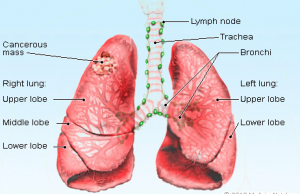Necitumumab (Portrazza) approved for the treatment of advanced squamous non-small cell lung cancer (NSCLC)

Last Updated on November 28, 2015 by Joseph Gut – thasso
November 28, 2015 – The American Food and Drug Administration (FDA) just approved Necitumumab (Portrazza) in combination with two forms of chemotherapy to treat patients with advanced (metastatic) squamous non-small cell lung cancer (NSCLC) who have not previously received medication specifically for treating their advanced lung cancer.
Necitumumab (Portrazza) is a monoclonal antibody that blocks activity of the epidermal growth factor receptor (EGFR), a protein commonly found on squamous NSCLC tutors. The efficacy of Necitumumab (Portrazza) was evaluated in a multicenter, randomized, open-label clinical study of 1,093 participants with advanced squamous NSCLC who received the chemotherapies gemcitabine and cisplatin with or without Necitumumab (Portrazza). Those taking Necitumumab (Portrazza) plus gemcitabine and cisplatin lived longer on average (11.5 months) compared to those only taking gemcitabine and cisplatin (9.9 months). Necitumumab (Portrazza) was not found to be an effective treatment in patients with non-squamous NSCLC.
Necitumumab (Portrazza) comes with some rather serious adverse effects though. The most common side effects of Necitumumab (Portrazza) are skin rash and magnesium deficiency (hypomagnesemia), which can cause muscular weakness, seizure, irregular heartbeats and can be fatal. Necitumumab (Portrazza) includes a Boxed Warning to alert health care providers of serious risks of treatment with Necitumumab (Portrazza), including cardiac arrest and sudden death, as well as hypomagnesemia.
Lung cancer is the leading cause of cancer death in the United States, with an estimated 221,200 new diagnoses and 158,040 deaths in 2015. The most common  type of lung cancer, non-small cell lung cancer, is further divided into two main types named for the kinds of cells found in the cancer – squamous cell and non-squamous cell (which also includes adenocarcinoma). “Since lung cancer tumors can be varied, treatment options need to be tailored to the specific type of lung cancer in the patient,” noted Richard Pazdur, M.D., director of the Office of Hematology and Oncology Products in the FDA’s Center for Drug Evaluation and Research, and suggested that the approval of Necitumumab (Portrazza) provides certain patients with squamous cell lung cancer a new option that may extend survival.
type of lung cancer, non-small cell lung cancer, is further divided into two main types named for the kinds of cells found in the cancer – squamous cell and non-squamous cell (which also includes adenocarcinoma). “Since lung cancer tumors can be varied, treatment options need to be tailored to the specific type of lung cancer in the patient,” noted Richard Pazdur, M.D., director of the Office of Hematology and Oncology Products in the FDA’s Center for Drug Evaluation and Research, and suggested that the approval of Necitumumab (Portrazza) provides certain patients with squamous cell lung cancer a new option that may extend survival.
However, the author of this blog likes to mention that seemingly the survival benefit of the combination of Necitumumab (Portrazza) and chemotherapy versus chemotherapy alone is incremental at best (see above, 9.9 months versus 11.5 months). Given the serious adverse effects profile of Necitumumab (Portrazza), the risk/benefit analysis of a treatment with Necitumumab (Portrazza) will not be easy for some patients and their treating physicians.
See and listen to the opinion of experts in oncology on Necitumumab (Portrazza):

